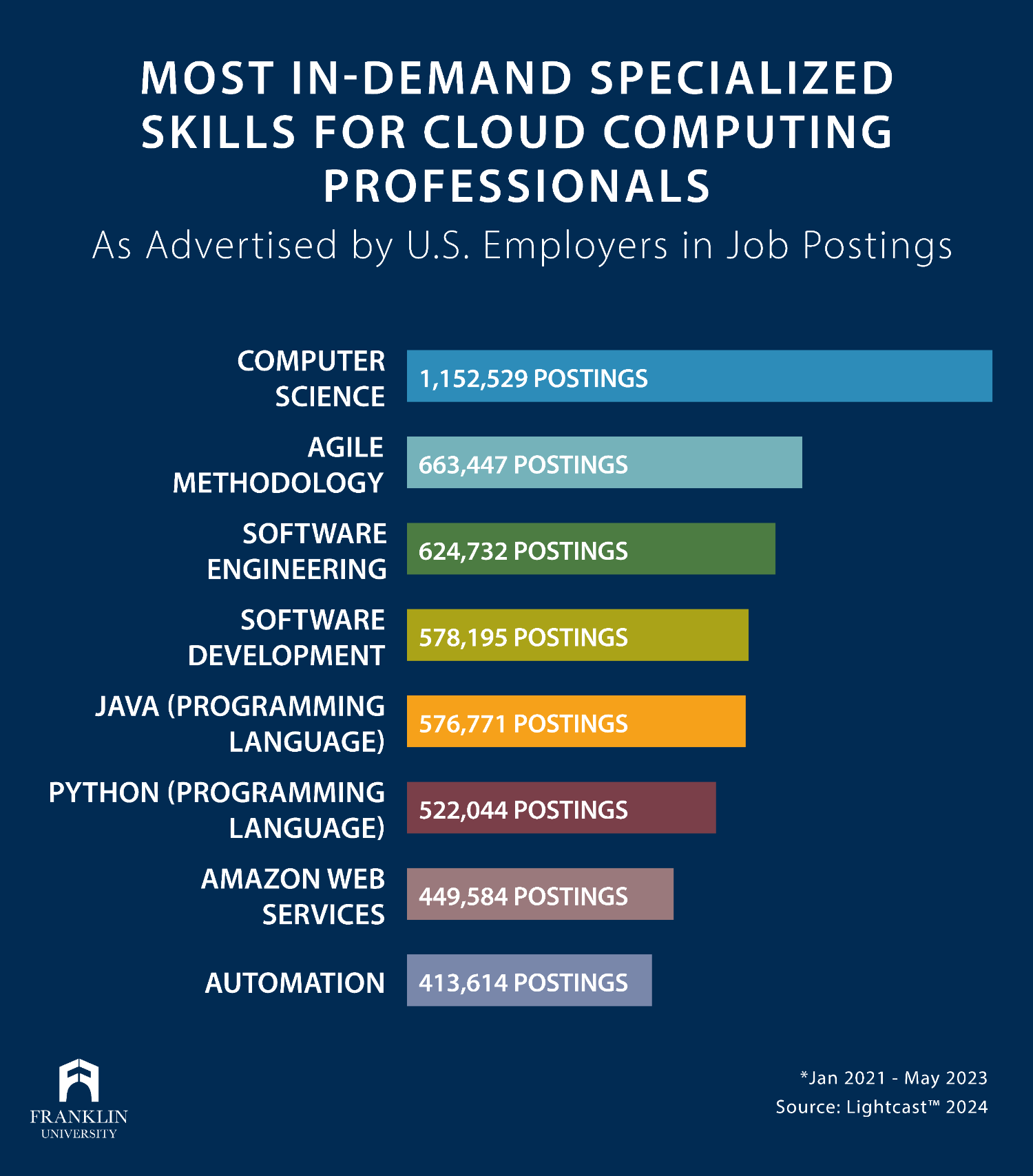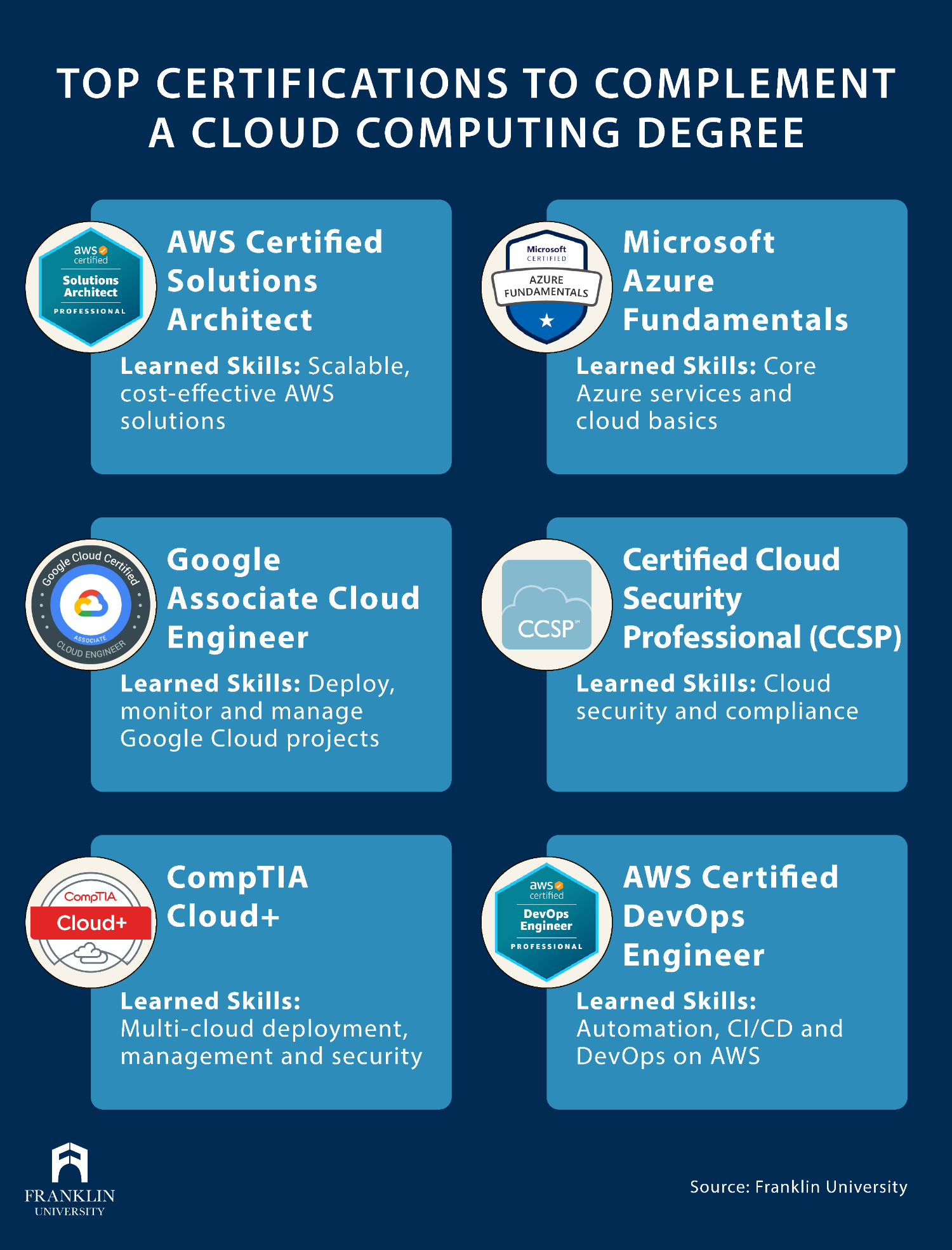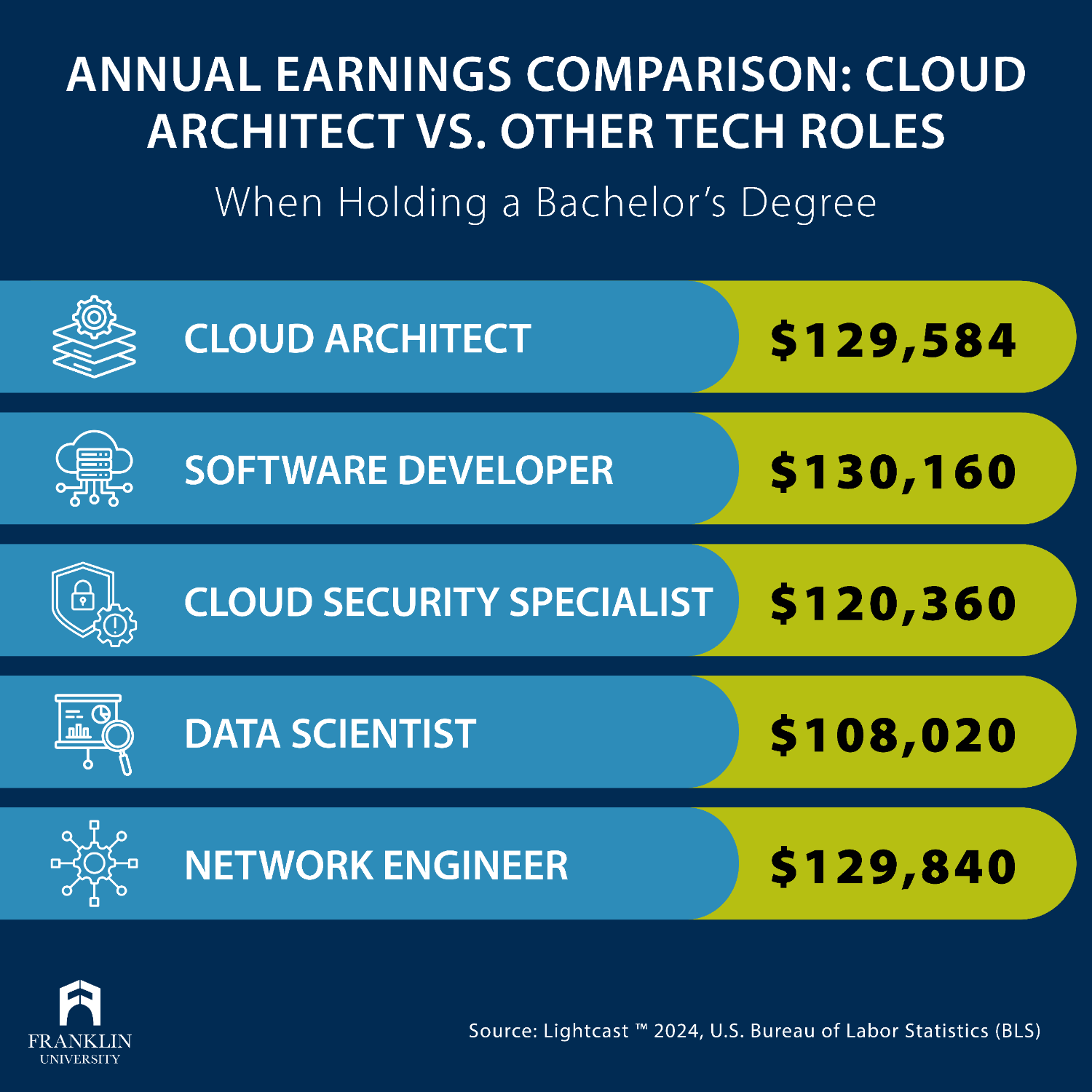Request Information
We're Sorry
There was an unexpected error with the form (your web browser was unable to retrieve some required data from our servers). This kind of error may occur if you have temporarily lost your internet connection. If you're able to verify that your internet connection is stable and the error persists, the Franklin University Help Desk is available to assist you at helpdesk@franklin.edu, 614.947.6682 (local), or 1.866.435.7006 (toll free).
Just a moment while we process your submission.

Is a Cloud Computing Degree Worth It?
Cloud computing, a technology that enables on-demand access to a shared pool of computing resources, has become an integral part of modern-day life.
From small startups to global enterprises, businesses increasingly rely on cloud-based systems for scalability, flexibility and efficiency, driving up the demand for cloud computing professionals.
This demand has, in turn, spurred an expansion of specialized cloud roles, such as cloud architects, security experts and cloud developers—all of which are reshaping how industries approach data storage, security and application deployment.
Given this increase in demand, the question for many aspiring cloud professionals becomes: is pursuing a bachelor's degree in cloud computing a sound career investment? That's what we’ll explore below.
Cloud Computing vs. Computer Science: What’s the Difference?
Cloud computing is a specialized subset of computer science, a field dedicated to developing, analyzing and applying algorithms and systems.
While computer science broadly covers areas like software engineering, data science and systems analysis, cloud computing narrows its focus to cloud architecture, storage solutions, data management and cloud-based services.
Cloud computing centers on building and managing cloud-based infrastructures, including virtualized environments and service models (such as SaaS, PaaS and IaaS). In contrast, computer science spans a wider range of technological innovations and applications beyond the cloud, like artificial intelligence, data science, computer programming and cybersecurity.
Understanding these differences is important for those considering which educational path aligns with their career goals.
Each career path offers unique opportunities, yet the skill sets and focuses differ substantially. For those specifically drawn to cloud infrastructure and services, a cloud degree offers direct pathways into specialized roles in cloud architecture and management.
Key Skills Gained With a Cloud Computing Degree
Dr. Mohammad Abu Shattal, program chair of the B.S. in Cloud Computing program at Franklin University, says that a cloud computing degree equips students with both the technical and soft skills needed to succeed in a technology-focused career. He notes that the curriculum balances technical skills and cloud strategy, ensuring graduates are well-equipped for competitive careers in cloud technology.
Graduates leave with skills tailored to cloud architecture, system management and project-based problem-solving—attributes that, as noted by Lightcast, are increasingly sought after by employers. Some of the key skills gained include:
Technical Skills:
- Cloud Architecture. Designing and managing cloud infrastructure.
- Virtualization. Understanding and managing virtual servers and data centers.
- Networking. Establishing secure, efficient and scalable networks.
- Cloud Security. Securing data in cloud environments.
- DevOps. Building and deploying applications within a cloud-based framework.
Soft Skills:
- Problem-Solving. Approaching challenges in a dynamic field with innovation and adaptability.
- Project Management. Coordinating cloud projects from planning through execution.
- Collaboration. Working effectively across teams to implement cloud solutions.
These skills translate directly to real-world roles. For example, a cloud architect must understand both the technical complexities of cloud infrastructure and possess the problem-solving acumen needed to maintain system integrity and security. They also need proficiency in networking and virtualization to meet the demands of modern, interconnected cloud systems.

Cloud Architecture in Demand: Industry Insights
According to job market data from Lightcast, cloud computing roles that require a bachelor’s degree are projected to grow by 21.3% in the United States through 2033, with a median advertised salary of $107,300 a year.
Many top tech giants, including Amazon Web Services (AWS), Google Cloud and Microsoft Azure, are constantly seeking skilled cloud professionals to help develop and manage their infrastructures.
In addition to technology firms, sectors such as healthcare, finance and retail are increasingly adopting cloud solutions, further driving demand for cloud architects, engineers and consultants.
The broad applicability of cloud computing skills across various industries makes this field highly versatile, with job security and competitive salaries often matching the high demand for expertise.
When it comes to paying for school, grants are among your best options. But do you know how to find them? Remove the guesswork by downloading this free guide
Who Should Consider a Cloud Computing Degree?
A cloud computing degree may be ideal for those who have a strong interest in cloud technologies and cloud-based solutions. While anyone with a technical background can benefit, certain types of students and professionals are especially well-suited for a career in cloud computing, including:
- Computer Engineering & IT Professionals. Those currently working in engineering or IT who seek to specialize in cloud development and solutions.
- Computer Science Majors. Individuals looking to pivot toward a career in digital architecture and cloud services.
- Recent Graduates. High school graduates with a passion for cloud computing technologies or who are already considering computer science schools to advance their foundational knowledge.
Aspiring cloud engineers interested in pursuing a tech career should possess skills or interests in areas like virtualization, network management, data security and cloud programming. Those who enjoy problem-solving, innovative thinking and collaborative work environments will likely find their higher education path to be a fulfilling one.
Certifications vs. Degrees: Which Path to Cloud Expertise?
Prospective cloud computing professionals often face a choice between pursuing certifications or a degree program. Both paths offer valuable knowledge and skills, but they serve different purposes in advancing a cloud computing career.
- Certifications. Cloud certifications and cloud computing courses, like AWS Certified Solutions Architect or Microsoft Azure Fundamentals, provide targeted expertise on specific platforms. They are usually faster to obtain and less costly than a degree, making them ideal for professionals seeking quick entry or advancement in cloud computing. Certifications show proficiency in specific cloud services and are highly valued by employers.
- Degrees. A cloud computing bachelor's degree offers a broader, more comprehensive education. In addition to technical skills, degree programs include courses in project management, software development, and business and collaborative skills, areas often absent in certification training. While more time-consuming and costly, a degree demonstrates deep, well-rounded expertise, often leading to advanced roles. It also gives aspiring cloud professionals the opportunity to advance their education via a master's degree, should they be inclined.
It should also be noted that having both a degree and certifications can be highly advantageous.
For instance, a cloud computing degree combined with certifications may qualify candidates for advanced roles like cloud architect, where both practical knowledge and strategic understanding are necessary.

Career Prospects: What Can You Do With a Cloud Computing Degree?
Dr. Abu Shattal explains that, with a cloud computing degree, graduates can pursue various specialized roles across industries.
“A cloud computing degree can significantly impact career growth in specialized areas like cloud architecture, security, DevOps, data management and strategic cloud management. This degree provides deep technical knowledge and hands-on experience with essential frameworks, preparing professionals for advanced roles,” Shattal said.
This aligns with data from Lightcast, which shows that cloud careers in the United States requiring a bachelor’s degree often come with competitive salaries and promising growth potential. Common roles include:
- Cloud Architect:
The most common career path. Designs and implements cloud infrastructure to meet organizational needs.- Annual Advertised Median Earnings (2023): $129,584
- Projected Job Growth (Through 2033): +7.9%
- Cloud Engineer:
Builds and maintains cloud systems, ensuring they run smoothly and securely.- Annual Advertised Median Earnings (2023): $145,080
- Projected Job Growth (Through 2033): +25.5%
- Cloud Systems Administrator:
Manages and supports cloud and computer systems, ensuring system availability.- Annual Advertised Median Earnings (2023): $101,212
- Projected Job Growth (Through 2033): +11.7%
- Cloud Security Consultant:
Focuses on protecting data within cloud systems and preventing breaches.- Annual Advertised Median Earnings (2023): $120,360
- Projected Job Growth (Through 2033): +33.1%
The cloud computing field is one of rapid growth, particularly in industries like healthcare, finance and e-commerce, where data storage, accessibility and security are critical. With cloud solutions changing business processes across various sectors, cloud computing professionals will continue to find opportunities in diverse industries.

Cloud Computing and the Future of Technology
Emerging trends like AI and machine learning integration, edge computing and cloud security advancements are revolutionizing the cloud computing field.
By leveraging these technologies, cloud computing professionals can build more powerful, responsive and secure systems capable of managing vast amounts of data in real-time.
Cloud computing is also at the forefront of some of the most innovative advancements, such as smart cities, IoT (Internet of Things) applications and AI-driven cloud platforms. These technologies are enabling new levels of efficiency, connectivity and automation across industries, which is also giving rise to exciting new job opportunities.
Dr. Abu Shattal notes that a cloud computing degree prepares professionals to be adaptable and forward-thinking, which can help them as the technological landscape continues to shift.
“By learning to independently explore new tools and solve complex issues through a cloud degree, students develop the adaptability and troubleshooting skills essential for thriving in a field that continuously evolves with new cloud technologies and practices.”
Ready to Jumpstart Your Cloud Computing Career?
Franklin University offers a Bachelor’s in Cloud Computing designed to provide students with the technical and practical skills necessary to succeed. This program emphasizes flexibility and accessibility, making it a strong option for individuals balancing work, family or other commitments.
With experienced faculty guiding students through real-world applications, Franklin ensures that graduates are prepared to enter the workforce confidently. Find out more about this cloud computing degree program, or apply today to get started!





